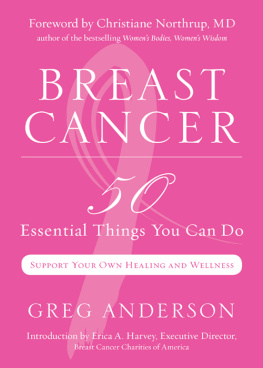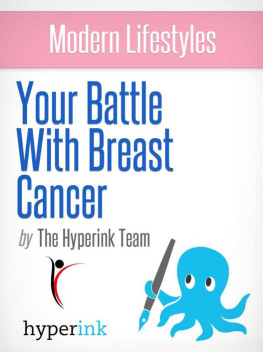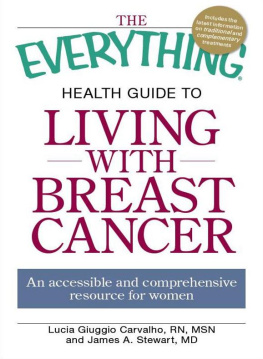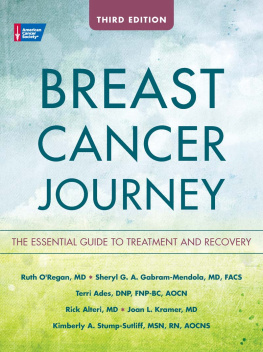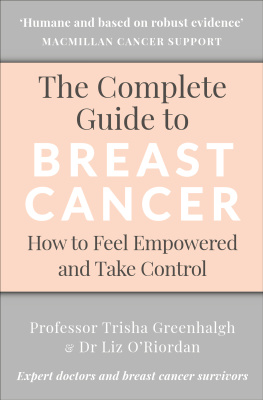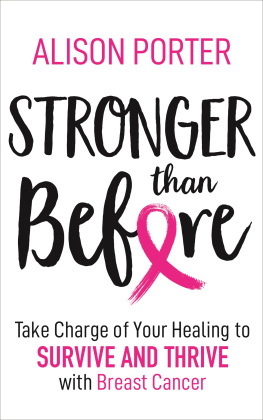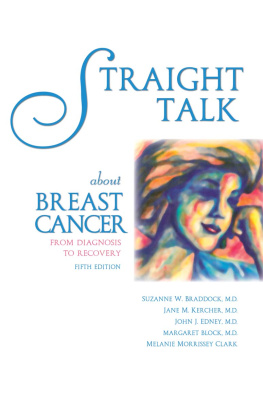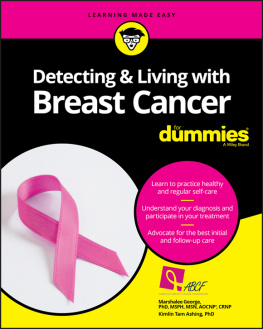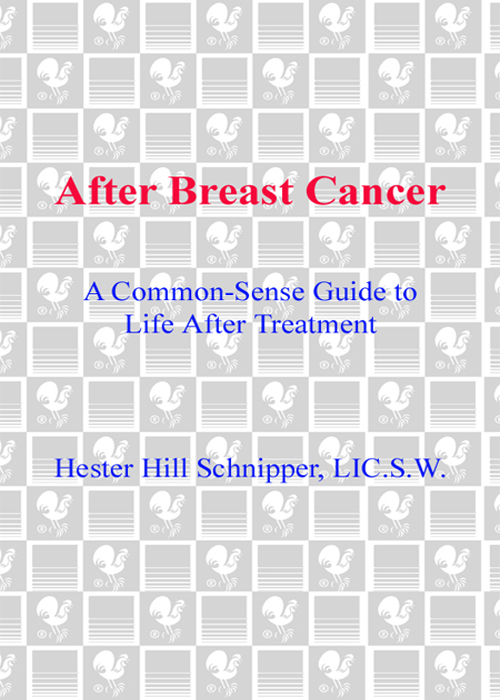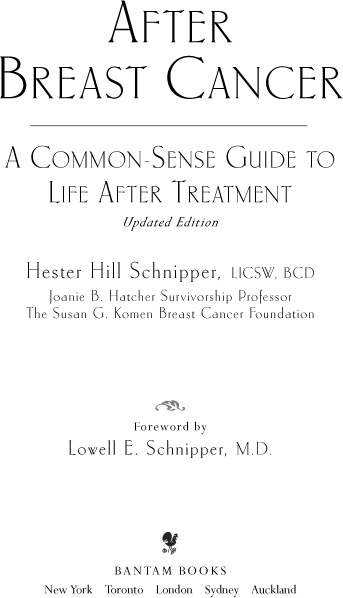Foreword copyright 2003 by Lowell Schnipper, M.D.
Bantam Books and the rooster colophon are registered trademarks of Random House, Inc.
Praise for AFTER BREAST CANCER
A one-on-one support vehicle that will be most appreciated Written in an approachable and engaging manner, this book is highly recommended.
Library Journal (starred review)
Straightforward yet eloquent. The womenand their loved oneswho read this book will feel validated and normal for what they experience. How I wish I had had it in hand eighteen years ago to know that recovery was really a journey and that I was not walking this path alone.
Beverly J. Parker
Director of the Y-Me National Hotline Hester Hill Schnipper has provided us with a moving, accurate, and inspiring account of life after breast cancer. An extremely valuable resource.
Patricia A. Ganz, M.D.
Director of Cancer Prevention and Control Research UCLA Jonsson Cancer Center Survivorship requires new levels of awareness, sensitivity, and emotional sturdiness from everyone involved. Hester Hill Schnipper, one of the Foundation's first Professors of Survivorship, has great understanding of the challenges breast cancer survivors face. This book provides just that for patients, their physicians, and anyone who works with breast cancer survivors.
Wendy Mason
The Susan G. Komen Breast Cancer Foundation, Inc. Intimate and direct covers all aspects of the experience A guide to help [women] understand their infinitely complex circumstances and find hope.
Publishers Weekly
I was diagnosed with breast cancer at the age of thirty-two. While the shock of diagnosis and the rigors of treatment proved difficult to manage, nothing has compared to the strain of dealing with life after breast cancer. Lest anyone think this book is merely another self-help guide, it is packed with practical information on everything from physical recovery to sexuality to professional concerns. A fantastic job.
Sarah A. O. Eisenberg Massachusetts/Rhode Island Young Survival Coalition

For Lowell
Who shares and lives our dream
And
For Katharine and for Julia
Who will find their own

Contents
Foreword
I write these words as a physician who has specialized in oncology for many years. I write these words as a husband who thirteen years ago found that his beloved was stricken with her first breast cancer and eight months ago with her secondnot a recurrence of the first, but a new event. These experiences have changed me. My perceptions of caring for women with breast cancer have been forged in the furnace of Hester's experience. I now see every patient through the prism of a long professional life and the anxiety of a devoted partner.
The moment a woman hears a diagnosis of breast cancer, her world is forever different. Initially stunned to the point of numbness, she gradually finds an equilibrium that enables her to wind her way through a complex process. She is called upon to sift through an overwhelming amount of information and to make difficult decisions about treatment choices so she can arrive at the options that are best for her. While that process is all-consuming, the help of a team of surgical and medical oncologists offers most women a structure of relationships that conveys a sense of security, if not well-being.
When the chemotherapy or radiation therapy that follows surgery is completed, however, many women experience a renewed sense of vulnerability. The awareness that there are no tests available to prove whether or not the breast cancer therapy has been fully successful provokes anxiety and often depression. The uncomfortable and image-altering effects of therapy are slow to recede and take their toll on the sense of womanhood, on her role as a partner in a relationship and a sexual being. Inevitably, underlying all of this is an existential anxiety that at the least is distracting and at most can be paralyzing.
Women need to understand that these feelings are normal; they are not unique, are usually transitional, and can be dealt with. They need to know about the physical realities of their bodies now that treatments have concluded. They need to know how to take the best care of themselves. And most importantly, they need help in integrating the cancer experience into the context of their lives in ways that enable them to grow and evolve, so that they come to see the future as an opportunity and can act on it while not denying the uncertainties that the cancer experience has introduced. They need a guide to negotiate the difficult waters of survivorship, and this is why Hester decided to write this book.
In the aftermath of breast cancer treatment, the body begins to renew itself, but the spirit takes an undulating course. While I realized this before Hester was diagnosed, that recognition was transformed by her illness. Not uncommonly, the first post-chemotherapy visit with a patient would bring me into the examination room expecting a relieved countenance. Not so fast! That affect is tentative if present at all, and what I more often see is someone overtly sad and scared. It's as though the hair shirt of chemotherapy that was just removed had been a coat of armor. How to convince her that its protection can be enduring? How to encourage engagement in life rather than retreat; how to instill confidence in the face of vulnerability? There was a time when I believed that my words alone would suffice. No longer. Greater wisdom set in after Hester's cancer. Now I sit with my patients, sometimes hand in hand, and empathize with the fear while coaxing them to point toward the future. Words are not magic, not even mine, but light at the end of the tunnel can be seen only when the eyes are open. And they will open, once the darkest of the shadows recede. It is then that the sense of possibilities reemerges. As a patient once told me, memorably, To dance with death, to weep over it, to rage at it, even to laugh at it, brings a kind of resolution, an encounter with mortality that is truly a life-changing event.
Never again will life be the samenot mine, and certainly not Hester's. The future is riddled with ifs, certainty an evanescent memory. But there is a new immediacy to our life: hers alone, mine alone, and ours together. The gold-and platinum bands we had made prior to her surgery, and have worn since, have become the metaphor that binds us to each other. Officially, our wedding occurred on the first day of a New Year, and then we flew off to the Serengeti. Very often, my lighthearted but serious admonition to women embarking on a course of chemotherapy is to plan a trip at the beginning and to take it when you're done. It's a restorative: a prescription marking the end of the beginning, and beginning again.


